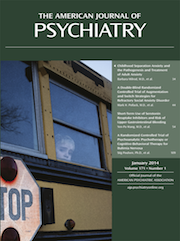Neuropsychological Decline in Schizophrenia From the Premorbid to the Postonset Period: Evidence From a Population-Representative Longitudinal Study
Abstract
Objective
Despite the widespread belief that neuropsychological decline is a cardinal feature of the progression from the premorbid stage to the chronic form of schizophrenia, few longitudinal studies have examined change in neuropsychological functioning from before to after illness onset. The authors examined whether neuropsychological decline is unique to schizophrenia, whether it is generalized or confined to particular mental functions, and whether individuals with schizophrenia also have cognitive problems in everyday life.
Method
Participants were members of a representative cohort of 1,037 individuals born in Dunedin, New Zealand, in 1972 and 1973 and followed prospectively to age 38, with 95% retention. Assessment of IQ and specific neuropsychological functions was conducted at ages 7, 9, 11, and 13, and again at age 38. Informants also reported on any cognitive problems at age 38.
Results
Individuals with schizophrenia exhibited declines in IQ and in a range of mental functions, particularly those tapping processing speed, learning, executive function, and motor function. There was little evidence of decline in verbal abilities or delayed memory, however, and the developmental progression of deficits in schizophrenia differed across mental functions. Processing speed deficits increased gradually from childhood to beyond the early teen years, whereas verbal deficits emerged early but remained static thereafter. Neuropsychological decline was specific to schizophrenia, as no evidence of decline was apparent among individuals with persistent depression, children with mild cognitive impairment, individuals matched on childhood risk factors for schizophrenia, and psychiatrically healthy individuals. Informants also noticed more cognitive problems in individuals with schizophrenia.
Conclusions
There is substantial neuropsychological decline in schizophrenia from the premorbid to the postonset period, but the extent and developmental progression of decline varies across mental functions. Findings suggest that different pathophysiological mechanisms may underlie deficits in different mental functions.



